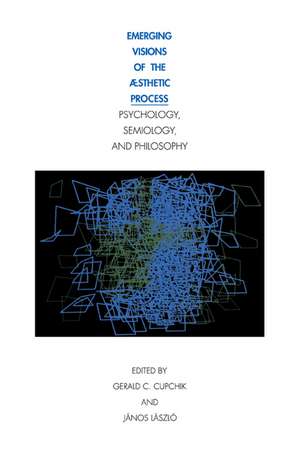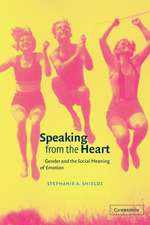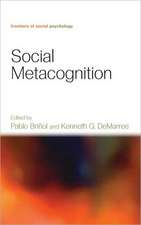Emerging Visions of the Aesthetic Process: In Psychology, Semiology, and Philosophy
Editat de Gerald C. Cupchik, Janos Lászlóen Limba Engleză Paperback – 5 noi 2008
| Toate formatele și edițiile | Preț | Express |
|---|---|---|
| Paperback (1) | 289.19 lei 6-8 săpt. | |
| Cambridge University Press – 5 noi 2008 | 289.19 lei 6-8 săpt. | |
| Hardback (1) | 730.72 lei 6-8 săpt. | |
| Cambridge University Press – 24 sep 1992 | 730.72 lei 6-8 săpt. |
Preț: 289.19 lei
Nou
Puncte Express: 434
Preț estimativ în valută:
55.35€ • 60.15$ • 46.53£
55.35€ • 60.15$ • 46.53£
Carte tipărită la comandă
Livrare economică 21 aprilie-05 mai
Preluare comenzi: 021 569.72.76
Specificații
ISBN-13: 9780521089746
ISBN-10: 0521089743
Pagini: 348
Ilustrații: 17 b/w illus. 5 tables
Dimensiuni: 156 x 234 x 18 mm
Greutate: 0.49 kg
Editura: Cambridge University Press
Colecția Cambridge University Press
Locul publicării:New York, United States
ISBN-10: 0521089743
Pagini: 348
Ilustrații: 17 b/w illus. 5 tables
Dimensiuni: 156 x 234 x 18 mm
Greutate: 0.49 kg
Editura: Cambridge University Press
Colecția Cambridge University Press
Locul publicării:New York, United States
Cuprins
1. Daniel Berlyne and disinterested criticism: inter- and intra-disciplinary discourse John Furedy; Part I. Visual Aesthetics: 2. But is it science? Rudolf Arnheim; 3. The 'frame' as a key to visual perception Nycole Paquin; 4. Aesthetics and visual semiotics Fernande Saint-Martin; 5. The complementarity of art and design Tsion Avital; 6. From perception to production: a multileveled analysis of the aesthetic process Gerald C. Cupchik; 7. A science of vision for visual art Francois Molnar; 8. Sweetness and light: psychological aesthetics and sentimental art Andrew Winston; 9. Psychobiography and visual creativity: four pattern Pavel Machotka; 10. Cognitive profiles of artists Ellen Winner and M. Beth Casey; 11. Assessing knowledge in the visual arts George W. Hardiman, Feng J. Liu and Ted Zernich; Part II. Literary and Other Aesthetic Processes: 12. The beginning of a new psychology: Vygotsky's psychology of art Vladimir S. Sobkin and Dmitry A. Leontiev; 13. Empirical aesthetics in the USSR: selected topics Dmitry A. Leontiev, Vladimir M. Petrov and Vladimir S. Sobkin; 14. The psychology of literature: a social-cognitive approach Janos Laszlo; 15. Why literature is not enough, or: literary studies as media studies Siegfried J. Schmidt; 16. Uncovering the laws of literary history Colin Martindale; 17. Evolution of art and brain asymmetry: a review of empirical investigations Vladimir M. Petrov; Part III. Play: 18. A neurophysiological theory of play Istvan Bende and Endre Grastyan; 19. Paradoxes of children's play in Vygotsky's theory Elena A. Bugrimenko and Elena O. Smirnova; 20. The personal component in playing interfaces Moshe D. Caspi.
Recenzii
"...this volume is both intelligible and compelling for almost everyone with an interest in aesthetics....Superb contributions on artist psychology and knowledge in relation to interpretation provide bulletproof protection for category approaches to art, and breathtakingly original essays on sentimental art and the complementarity of art and design deserve to be read alongside the canonical works of philosophical aesthetics." Journal of Aesthetics and Art Criticism
Descriere
This book is about aesthetic processes and play from the perspectives of psychologists, philosophers and semiologists.











